Monday, July 26, 2010
A Nahhamu Devar Torah from Rabbi DINDŠ
The question is, what's מבשרת ציון scared of, such that in the הפטרה of שבת נחמו she needs to be encouraged by the קול not to fear when she goes up onto the mountains to announce Redemption to a dry-grass world?
To answer, look back at the parasha, ואתחנן, in which Moshe begs God to let him into the Promised Land, but instead gets told to go up onto a nearby mountain to get a nice view of Cana‘an... because he'll never see it close up.
Maybe the מבשרת ציון is scared that if she goes up the mountain with her message of messianic peace and wonder, she'll never make it all the way there, like Moshe Rabeinu. But the prophecy continues with descriptions of God's transcendent greatness — measuring out earth and heaven, naming every single star beyond — to reassure her that this future redemption is being driven by a Force that knows what it's doing.
At first I thought it could mean that when redemption is enacted by God directly, every individual (like the stars) will not be lost, unlike with Moshe who was a human being dealing with the people on God's behalf. But we don't always think of the future redemption as Divine handwaving and handholding... so what would that mean for a process of slow human process towards the perfection that God has pointed us towards? Maybe it's an end to fear and worry. Maybe מבשרת ציון will never make it to ציון herself, but she should not give up hope. She's just a little piece in a big play, and everyone does their part to water the dry grass and weary minds so that they will sprout hopeful futures.
Wednesday, September 23, 2009
MASS RABBINIC ARREST 2
mass rabbinic arrest
mass rabbinic a.c.d.
mass rabbinic impact
mass rabbinic closure
Well, they were at it again today!
About 50-100 rabbis (sorry for the vague number, didn't get to count them myself), most affiliated with the New York Board of Rabbis, obstructed traffic on First Avenue in Manhattan, NYC, just south of the United Nations, at 41st street. The police threatened them with arrest, and most of the protestors moved aside, but 11 stood (sat?) their ground and went all the way in order to highlight dramatically the danger that Pres. Ahmadinejad of Iran poses to his own people, to America, to Israel and to the rest of the world.
Please note: If you would like to make use of my photos, I am happy to contribute — but please email me at shtegosaurus you-know-what gmail etc. to ask for attribution information first! Thank you.
Preparing for the Protest
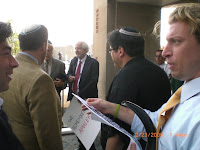

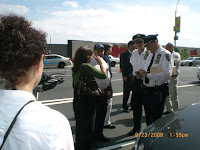
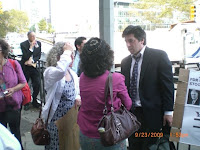
Protest Rally on the Sidewalk
With Speeches, Prayers and Tehillim



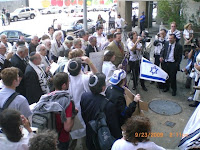

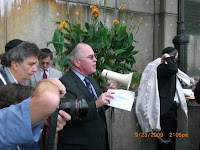
Stepping Out Onto the Street
and Obstructing Traffic




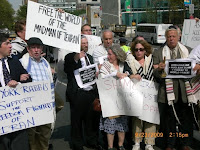

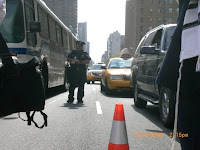

Sounding the Shofar


Final Warnings from the NYPD

Protesters Willing to Risk Arrest
Sit Themselves Down on the Street
and Refuse to Move
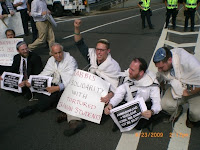
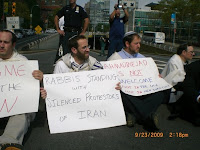
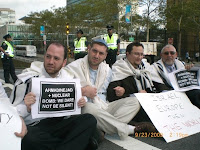
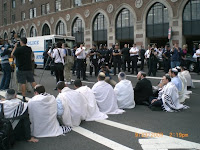
Arresting the Civilly-Disobedient Protesters




Loading the Arrestees into Police Vans
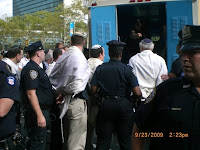

And a Few Self-Reflective Media Photos
because i admire real journalists
like Steven I. Weiss of The Jewish Channel


Also, see the following videos of the rabbis sounding their shofars and chanting "STOP HIM [=Ahmadinejad] NOW" as the NYPD orders them to stop blocking traffic, and of Shmuly Yanklowitz (of Uri L'Tzedek speaking passionately of the danger that the Iranian president poses to the world:
I'm just an amateur blogging photojournalist, but these real media reported on the civil-disobedience protest:
‘Arutz Sheva‘ HEBREW and ENGLISH and an INTERVIEW
Asbury Park Press BEFORE and AFTER
NY Post VIDEO
The Jewish Channel's Week In Review VIDEO
Yahoo! News PHOTOS
Thursday, July 30, 2009
Another Thought on “Eli Tziyon”
אלי ציון ועריה כמו אשה בציריה
וכבתולה חגורת שק על בעל נעוריה
The piyyut compares Zion to a virgin, girded in sackcloth, [mourning] the husband of her youth. When singing this caoineadh this morning, I noticed the incongruity of that line. If she's a בתולה, a virgin, how has she been married long enough to be widowed?
At that point I realized — Tziyon's metaphorical husband died before they were able to "consummate" their marriage. All the pieces were there, but the job was never finished.
We were living free in our Land.
We had a House for God.
We had self-government.
We had prophets and miracles.
The marriage had taken effect — all the pieces were there in the formal relationship between God, People, Torah and Land — but it was never finalized. We never created the holy and just society that we were meant to. We never truly became a mamlekhet kohanim vegoy ḳadosh. We never taught the world to aspire to Unity.
It's not just what was there that we lost — it's the potential that we lost, too. The uncompleted task.
Saturday, July 25, 2009
Subverting Mourning
I was thinking about that this past Friday Night, as we sang Lekha Dodi to the tune of Eli Tziyon at shul, and I realized that it's not quite that simple. Lekha Dodi interweaves two themes — one is the approach of Shabbat, and the other is aspirations for Redemption. Matisyahu got the title of his album “Shake Off the Dust... Arise” from Lekha Dodi, after all, where it refers to the Jerusalem and the Jewish People, identified with each other, shaking off the necrotizing chains of exilic lethargy and rising to meet the Messianic Age.
Lekha Dodi is fundamentally hopeful — just as we stand at the end of the mundane week, on the threshold of the transcendent alternate universe of Shabbos, it looks out from Galut forwards, hopefully towards the Coming Days, and leaving the Valley of Tears behind.
When we foreshadow Tish‘a B’av by singing Lekha Dodi to the tune of Eli Tziyon, we aren't taking the mournful nature of the Fast and applying it to Shabbat where it doesn't belong — we're subverting and undercutting the entire mourning process before it's even had a chance to really get started. We go into Tishabav confident and hopeful, looking forwards towards the as-yet-unfulfilled prophecies of Consolation, instead of just looking back at the already-fulfilled prophecies of Calamity. Long before we read Eikha, we've already spun its message.
Complete and utter side-point:
You can also use the tune of Eli Tziyon to sing the song of the Dwarves longing for their dispossessed homeland in Prof. JRR Tolkien's The Hobbit, both the English original and הנעמי's Hebrew translation. Which is pretty cool, considering the similar themes.
Thursday, July 16, 2009
Star-K, Meet Star-H

It looks like the followers of Muslim Dietary Laws are finally following in the footsteps of us who keep Jewish Dietary Laws, and starting certification organizations with recognizable symbols. I hope the Va‘ad of Baltimore doesn't go after these guys for trademark infringement or something!
Star-K[osher], meet Star-Ḥ[alāl]!
Now the question is... how long until they too have certification scandals?
Monday, July 13, 2009
Two and a Half Poems
„חוֹזֶה, לֵךְ בְּרַח“
"לֵךְ בְּרַח?" – לֹא-יִבְרַח אִישׁ כָּמוֹנִי!
הֲלוֹךְ בַּלָּאט לִמְּדַנִי בְקָרִי,
גַּם דַּבֵּר כֵּן לֹא-לָמְדָה לְשׁוֹנִי
וּכְקַרְדֹּם כָּבֵד יִפֹּל דְּבָרִי.
"Go flee?" — a man like me does not flee!
My cattle taught me to walk softly;
But my tongue never learned to speak so,
My word instead falls like a heavy ax.
וְאִם-כֹּחִי תַם לָרִיק – לֹא-פִשְׁעִי,
חַטַּאתְכֶם הִיא וּשְׂאוּ הֶעָוֹן!
לֹא-מָצָא תַחְתָּיו סְדָן פַּטִּישִׁי,
קַרְדֻּמִּי בָא בְּעֵץ רִקָּבוֹן.
And if my strength was expended for naught — it's not my bad;
It's your sin, so deal with your crime!
My hammer did not find its anvil underneath,
my ax came into rotten wood.
אֵין דָּבָר! אַשְׁלִים עִם-גּוֹרָלִי:
אֶת-כֵּלַי אֶקְשֹׁר לַחֲגוֹרָתִי,
וּשְׂכִיר הַיּוֹם בְּלִי שְׂכַר פָּעֳלִי
אָשׁוּבָה לִּי בַּלָּאט כְּשֶׁבָּאתִי.
No matter! I will deal with my fate:
I will tie my tools to my belt,
And like a laborer stiffed of his pay
I will go back softly as I came.
אֶל-נָוִי אָשׁוּב וְאֶל-עֲמָקָיו
וְאֶכְרֹת בְּרִית עִם שִׁקְמֵי יָעַר;
וְאַתֶּם – אַתֶּם מְסוֹס וְרָקָב
וּמָחָר יִשָּׂא כֻלְּכֶם סָעַר.
To my home I'll return and to its valleys
And I will enact a covenant with the forest sycamores;
And you — y'all are rotten and decayed
And tomorrow a storm will carry you away.
I'm not running
I'm not running from today
If you meet me on the mountain
I won't be the one to pay
(You won't be the one to stay)
“Not Ready to Make Nice” by the Dixie Chicks
'Forgive' — sounds good
'Forget' — I'm not sure I could
They say time heals everything
But I'm still waiting
I'm through with doubt
There's nothing left for me to figure out
I've paid a price
And I'll keep paying
I'm not ready to make nice
I'm not ready to back down
I'm still mad as hell and
I don't have time to go round and round and round
It's too late to make it right
I probably wouldn't if I could
'Cause I'm mad as hell
Can't bring myself to do what it is you think I should
I know you said
Can't you just get over it
It turned my whole world around
And I kinda like it
I made my bed and I sleep like a baby
With no regrets and I don't mind sayin'
It's a sad sad story when a mother will teach her
Daughter that she oughta hate a perfect stranger
And how in the world can the words that I said
Send somebody so over the edge
That they'd write me a letter
Sayin' that I better shut up and sing
Or my life will be over
I'm not ready to make nice
I'm not ready to back down
I'm still mad as hell and
I don't have time to go round and round and round
It's too late to make it right
I probably wouldn't if I could
'Cause I'm mad as hell
Can't bring myself to do what it is you think I should
I'm not ready to make nice
I'm not ready to back down
I'm still mad as hell and
I don't have time to go round and round and round
It's too late to make it right
I probably wouldn't if I could
'Cause I'm mad as hell
Can't bring myself to do what it is you think I should
What it is you think I should
'Forgive' — sounds good
'Forget' — I'm not sure I could
They say time heals everything
But I'm still waiting
Wednesday, July 01, 2009
Beyond Evolution
It expresses what seems to be a very common view of spirituality today, the nature-centric "we are the universe made manifest" principle that many people have. It finds religious/moral value in the grandeur of nature and the rhythms of the natural world.
What the article doesn't seem to recognize is that some of us have spiritual/religious sensibilities that are based on the idea that humanity's sentience and self-reflective nature are a mandate to break with the rhythms of the brutal process of evolution. We're supposed to think and exercise altruism and self-restraint, not just give in to whatever urges and instincts lead to the tautological survival of the fittest.
Saturday, May 30, 2009
Incredible Cosmic Power:
a Shavuos ShulDrasha
All we have of חבקוק is three short chapters.
But תפילה לחבקוק is a hard-hitting masterpiece of praise, describing God as a divine warrior — the אִישׁ מִלְחָמָה of the Song at the Sea — whose power and glory cover the heavens and fill the earth, who shatters mountains and raises storms in both the upper and lower waters.
Reminiscent of the imagery used by our ancient polytheistic neighbors, חבקוק describes God as a wrathful storm-god, riding a divine ‘chariot of rescue’ into battle, casting flashes of lightning like arrows and spears, with plague and pestilence swarming along with God's heavy crushing steps.
But the battle that God is going out to fight is not a divine war or a metaphysical struggle. חבקוק asks rhetorically, הֲבִֿנְהָרִים חָרָה ה'؟ אִם בַּנְּהָרִים אַפֶּךָֿ؟ אִם בַּיָּם עֶבְֿרָתֶֿךָֿ؟ Is God angry at the rivers? Is God raging against the sea?
No!
This is not a skirmish in some eternal struggle between Order and Chaos; this is not the Creator forcefully asserting authority over the untamed rebellious Ocean, although such motifs do periodically occur in our tradition.
הֲבִֿנְהָרִים חָרָה ה'؟
No. God is not angry with the waters.
The rays of light bursting from God's hand; the rent earth, the rushing torrents, the smashed mountains, the crackling lightning — what are they all for? What is the purpose of all this awe-inspiring violent pyrotechnics?
יָצָאתָֿ לְיֵשַׁע עַמֶּךָֿ לְיֵשַׁע אֶתֿ מְשִׁיחֶךָֿ
מָחַצְתָּ רֹּאשׁ מִבֵּיתֿ רָשָׁע עָרוֹתֿ יְסוֹדֿ עַדֿ צַוָּאר
חבקוק addresses God, answering his own question — “You have come forth to rescue your people; to rescue your anointed — you smash the head from the villain's house, razing it from foundation to neck.”
These tools of cosmic warfare, God's world-wrecking weapons, are not being used against cosmic enemies, against natural forces — but against the enemies of עם ישראל.
בְּזַעַם תִּצְעַדֿ אָרֶץ
“You tread the earth in rage”
— but God's enemy is not the earth —
בְּאַףֿ תָּדֿוּשׁ גּוֹיִם
“You thresh nations in fury.”
חבקוק speaks of his trembling fear, the rot in his bones at the enemy's approach — but אָנוּחַ לְיוֹם צָרָה he says, לַעֲלוֹתֿ לְעַם יְגֿוּדֶֿנּוּ “I wait calmly for the day of distress, for the arrival of the massing foe.”
It doesn't matter how powerful the enemy appears, because he is confident in God's power — incredible cosmic might brought down to earth, brought to bear against those who would do us harm.
וַאֲנִי he says, ,בַּה' אֶעְלוֹזָה אָגִֿילָה בֵּא'-ֵי יִשְׁעִי “I will rejoice in God, I will exult in God who rescues me.” וַיָּשֶׂם רַגְֿלַי כָּאַיָּלוֹתֿ וְעַל בָּמוֹתַֿי יַדְֿרִיכֵֿנִי “God makes my legs sure-footed as a deer, guiding my stride on my heights.”
It's not God standing there victorious over the slain body of some cosmic foe — it's חבקוק, it's the Jewish People, surveying deliverance from above and giving thanks for God's awe-inspiring power.
This isn't some cosmic metaphor —
it's the struggle of our own lives.
In the 89th Psalm, אֵיתָֿן הָאֶזְרָחִי sings of “God's eternal kindness” and he brings in this motif of God vanquishing the watery chaos. Only a few פסוקים later, though, he shifts the focus to דוד המלך to King David. Speaking in the voice of God, he says מָצָאתִֿי דָּוִדֿ עַבְֿדִּי “I have found דוד my servant” ... and then later, אַףֿ זְרוֹעִי תְֿאַמְּצֶנּוּ “my arm shall strengthen him.”
But what kind of strength is this, that God promises דוד?
וְשַׂמְתִּי בַֿיָּם יָדֿוֹ וּבַֿנְּהָרוֹתֿ יְמִינוֹ
Enough divine strength to have power over the sea and the rivers.
That same image of cosmic power — the strength of God the Creator and Commander of Nature, whom not even the most untamed force imaginable could resist — that is the power that God gives over to דוד, to a human being.
In חבקוק, God brings God's own power to bear to rescue us from our foes, and we stand there with the prophet, awestruck, as lightning rains down from heaven, the mountains quake, and the earth splits — as משה said before the Splitting of the Sea, ה' יִלָּחֵם לָכֶֿם וְאַתֶּם תַּחֲרִישׁוּן God will fight for you, while you remain silent.
In תהלים, though, God takes a step back.
God hands us the power, the strength, the cosmic force; the encouragement, the inspiration — and we become partners with God in fighting our own human battles and in confronting cosmic struggle.
However, this is not how Rabbinic Tradition reads תפילה לחבקוק. The reason we read this הפטרה today is because all the awe-inspiring pyrotechnics are not the sound of battle. As משה said, coming down from הר סיני —
אֵין קוֹל עֲנוֹתֿ גְּבֿוּרָה וְאֵין קוֹל עֲנוֹתֿ חֲלוּשָׁה
“It is not the voice of a call of victory,
and it's not the voice of a call of defeat” —
according to חז"ל, our Sages, תפילה לחבקוק is the voice of
וַיַּעַן כָּל הָעָם קוֹל אֶחָדֿ וַיֹּאמְרוּ
כָּל הַדְּבָֿרִים אֲשֶׁר דִּבֵּר ה' נַעֲשֶׂה
The call of the Israelite nation answering with one voice when they said ‘Everything which God has said, we will do.’
חבקוק's ‘wrathful storm-god’ imagery — the heavenly bolts — were the thunder and lightning, the heavy cloud that wreathed הר סיני at the Giving of the Torah.
The rays of light bursting from God's clenched fist — were the revelation of God's presence before the assembled people, and the glow of משה's face when he came down from the mountain after communing with the divine.
חבקוק's description of God's glory and power filling earth and heaven when God comes from פָּארָן — is the same as משה's reminiscing at the end of his life at the end of the תורה about God's appearance at סיני and פארן in the wilderness, when God came to give a living ‘firey law’ to עם ישראל.
And just as חבקוק stands awe-struck as heavenly power changes the world around him, קבלת התורה the acceptance of Torah by the people was an utterly passive act.
ר' אבדימי בר חמא בר חסא in מסכת שבת says that God lifted up the mountain and held it over בני ישראל and told them, ‘either accept the תורה or there you will be buried.’
The power was overwhelming; the evidence was overwhelming; the gratitude was overwhelming — God had just saved them from Egypt and from עמלק, sustained them in the wilderness through miraculous means — it was literally an offer they couldn't refuse, whether the mountain over their heads was physical, or ‘just’ psychological.
And then, when God did speak to בני ישראל, they were overwhelmed by the experience, and had to ask משה to be their representative, because they weren't strong enough to hear God's voice directly.
However, just as God in תהלים gives דוד the power to fight divine battles, to make a mark on the universe, so too God brings us in as partners in מלחמתה של תורה the “war of Torah” — the spiritual struggle to learn, to teach, to integrate, and to be creative. One of משה's final messages to בני ישראל at the end of his life is לא בשמים היא — the Torah is not in Heaven. It's not some faraway ideal or impossible feat, something whose divinity is limited to supernal realms.
It's right here, ready for you to take it and make your mark on it and let it make its mark on you.
בני ישראל needed to hear that message, after their passive, upturned-mountain acceptance.
רב יהודה in מסכת תמורה says that 3000 laws were forgotten during the days of mourning after משה's death. The people turned to his successor, יהושע, and told him to ask Heaven for answers. But יהושע refused. לא בשמים היא. It's not in heaven anymore. Figure it out yourselves. 3,000 laws were forgotten in just a few days, along with 1,700 rules of implication.
Our passive hands were too weak to hold on — until עתניאל בן קנז restored the laws and restored the rules through his own logical deductions.
He took hold of this cosmic power, this תורה, and became a partner with God.
We've just received the Torah once again.
We stood at the burning mountain,
wrapped in thunder and lightning,
and we heard God's voice.
And that burning mountain — that firey law — is ours now.
It's our responsibility.
It takes effort, and it takes struggle, to learn, to understand, to create to integrate and to apply.
This power was given to us so that we can impact it, ourselves, and all creation.
Just receiving Torah isn't enough —
it's time to take that next step.
And we have the whole rest of the year for that.
So let's get started.
Saturday, April 25, 2009
Happy New Year!
A Tazria‘-Metzora‘ DvarTorah
The first of ניסן is ראש השנה למלכים ולרגלים — the new year for calculating kings' reigns, and for counting months and holidays. Not long before פסח we read the parsha of החדש הזה לכם ראש חדשים, that ניסן, the month of liberation, is the first of all months.
Then there's the first of אלול, ראש השנה למעשר בהמה — the beginning of each yearly cycle for tithing livestock.
There's the first of שבט, or according to the other opinion in the משנה, the one we follow, ט"ו בשבט a.k.a. ראש השנה לאילנות, the beginning of each yearly cycle for tithing fruit trees.
And then there's the first of תשרי, the ראש השנה that we celebrate as "ראש השנה" — the New Year for years, for the שמיטה and יובל cycles, and for some other agricultural calculations, as well.
This past week I heard a lecture by ר' יובל שרלו. R' Cherlow is the ראש ישיבה of the ישיבת הסדר in פתח־תקוה in Israel, and one of the founders of צֹהַר, an organization that tries to help heal the divide between religious and secular Jews in Israeli society.
He said that in his ישיבה, he calls יום העצמאות, Israeli Independence day — which is coming up this coming Wednesday — ראש השנה למדינה. The New Year for the State of Israel.
Now let's just hold that thought — יום העצמאות as ראש השנה למדינה, the New Year for the State, and put it off to the side for a few minutes, while we discuss this morning's Torah reading.
One of the dominant topics in תזריע and מצורע is the mysterious malady known as צרעת.
The Torah tells us that צרעת — particularly-defined discolorations of the skin — can make a human being טמא, ritually impure.
Similar discolorations can have the same effect on clothing, and on houses.
רמב"ם and others see צרעת as a supernatural signal, warning the afflicted individual against speaking לשון הרע. The גמרא in מסכת ערכין brings a play on words — a person receives צרעת, and becomes a מצורע because they were מוציא שם רע, a slanderer.
In this view, the three forms of צרעת — on people, clothes, and houses — are stages of warning or punishment. When someone begins to spread rumors and libel, the first thing to go is their home. צרעת appears on the walls, as an early-warning system. If they persist in their destructive ways, eventually the house will have to be disassembled. If they still don't learn their lesson, the צרעת moves to their clothes, until the clothes need to be burned.
And in the end, if they still persist in misusing their God-given power of communication, the צרעת attaches itself directly to their body.
This is probably the most popular understanding of how צרעת worked. You'll find it in numerous parsha sheets and children's books.
But there are other explanations for the phenomena of צרעת and the rules of how to diagnose and deal with it — and I'd like to concentrate particularly on צרעת בתים, the impure discolorations that afflict houses.
In the same place in מסכת ערכין that includes the idea that a מצורע is a מוציא־שם־רע, a slanderer, one of the other opinions brought is that צרעת of houses isn't a punishment for misused speech, but for theft; similarly, another opinion identifies the relevant sin as stinginess.
As part of the house צרעת procedure, the building is emptied. All its contents are removed and placed outside. This way, if the house will be declared טמא, the contents will remain pure. However, while everything is outside, passers-by can — according to the "theft" opinion — identify their own stolen property, or — according to the view that blames צרעת on stinginess — they can see the wrench that the house's inhabitant denied owning when they asked to borrow it last week.
On the other hand, the צרעת of houses might actually be a good thing.
צרעת בתים can only occur in the Land of Israel, and רבי שמעון בר יוחאי claims that צרעת marked the location of buried Cana‘anite treasure that בני־ישראל inherited upon conquering the land. Breaking apart the walls of these houses wasn't a punishment but a challenge and a reward.
צרעת בתים, the צרעת of houses which can only occur in the Land of Israel, may be a guidepost, pointing the way to treasure and success, to better things to come; or it may be an alarm, an early-warning system alerting us that something is starting to go wrong. Theft, slander, selfishness —
society
our society
in our Land
may be beginning to break down.
So let's return to ר' שרלו and his ראש השנה למדינה.
יום העצמאות, he said, is not just about הלל or other newer synagogue rituals; it's not about concerts, parties, and barbecues in the park. It is about those things — because ראש השנה is a holiday, and so ראש השנה למדינה is a celebration of independence, creativity, and God-willing eventual complete redemption.
But ראש השנה is also a day of judgement — a day of looking back and looking forward.
And so ראש השנה למדינה needs to also be a day of paying attention, and of taking account.
The צרעת of houses could only occur in ארץ־ישראל — and it may have been a sign of coming good; or it could have been a sign
of developing danger; but it was always a signal to stop and think.
We don't have צרעת of any kind anymore. If you have Hansen's disease, psoriasis, mold on your clothes or mildew on your walls, and you're living in Israel, you don't have to go find a כהן because maybe it's צרעת and you need to know if you're טמא or טהור.
But we do have
יום העצמאות
ראש השנה למדינה
a day of celebration and of paying attention; a day to think about all the ways that things can and do go wrong; and all the ways to make sure that they go right. And when you get down to it, even the basic fact that Jews in the world today after two thousand years finally once again do have those challenges to face — is in itself a reason to celebrate.
חודש טוב
and שנה טובה.


